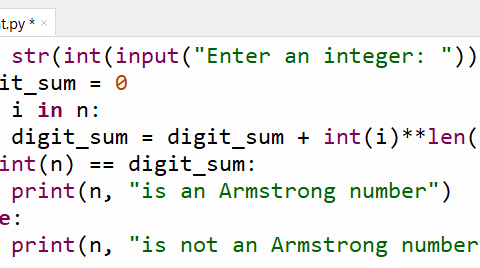
Sometimes, we want to remove leading zeros (0s) from a string like “00098” becomes “98” only. In Python, there are several ways to do this. We will be discussing some of them in this article.
"00921" --> "921"1. The int() method to remove leading zeros in Python
You can use the Python int() method to remove leading zeros from a string like this-
my_string = "000213"
my_string = int(my_string)
print(my_string)Output:
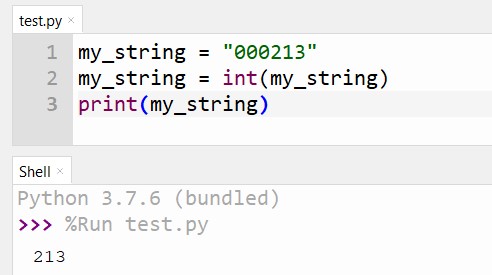
The first method is the int() method, which converts a string into an integer. While converting, it will automatically remove leading zeros in the string. Note that the string should only contain numbers and no letters, alphabets, or other symbols.
2. The lstrip() method to remove leading zeros
The strip() method takes a string argument. This method will remove the string given as the argument from the string in operation. When used, it automatically removes leading zeros ( only ) from the string. Note that this works for numbers and all characters accepted as a string. However, another method strip() will remove the leading and ending characters from the string. Python lstrip() docs.
You can use the Python lstrip() method to remove leading zeros from a string like this-
my_string = "00913"
my_string = my_string.lstrip('0')
print(my_string)Output:
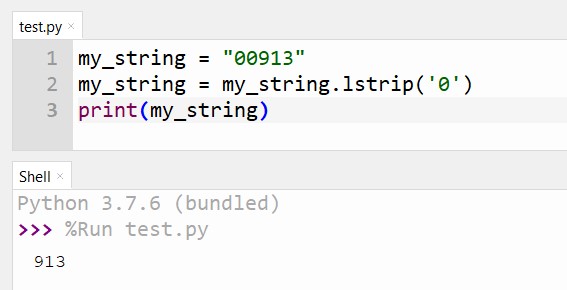
3. Reassigning until the character in the 0th index is “0”:
In this method, we will loop through a string and check whether the string’s first character is “0”. If the first character is “0,” then we will reassign the string from the first index. This is fairly simple and can be understood by looking at an example.
You can use the reassigning method to remove leading zeros from a string like this-
my_string = '0002134'
for i in my_string:
if i == '0':
my_string = my_string[1:]
print(my_string)Output:
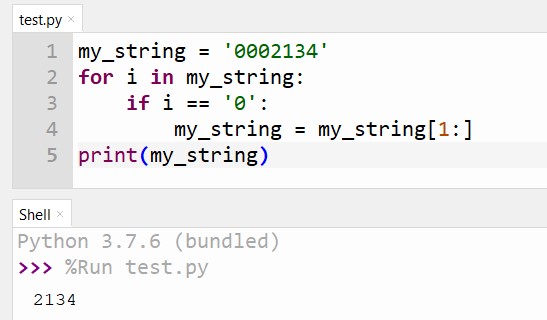
Output for the method of reassigning until the character in the 0th index is “0”
4. The startswith() method:
In this method, we will loop through a string and check whether the string’s first character is “0” with the startswith() method. This will return a boolean value, and we will use the same concept from 3rd way.
You can use the Python startswith() method to remove leading zeros from a string like this-
my_string = "00023"
for i in my_string:
if i == "0":
my_string = my_string[1:]
print(my_string)
>> 23
my_string = "00023"
for i in my_string:
if i == "0":
my_string = my_string[1:]
print(my_string)
>> 235. Using regex (Regular Expression) to remove leading zeros in Python string:
Python has a built-in Regular Expression module, namely, “re.” We can also remove the leading zeros from a string of numbers using this module. This is a simple task and can be understood once the code looks at.
The code:
import re
regex = "^0+(?!$)"
str = "000782"
str = re.sub(regex, "", str)
print(str)Output:
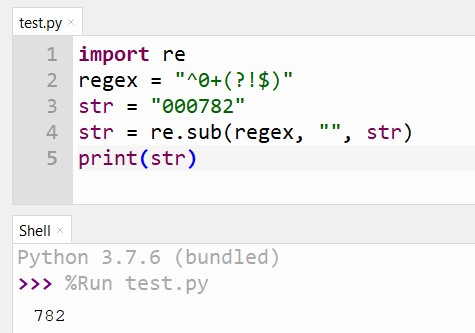
Possible Reasons to remove leading zeros or trailing zeros from a number or a string?
- For formatting time – 01:24 to 1:24
- For stripping IP Address
- For stripping units of data: 4000 to 4K
Checkout Short Video:
Keep Learning, Keep Coding
Also Read:
- Aam Aadmi vs Corrupt System: How ChatGPT Helped One Guy Expose Govt Fraud, The Story: “Ravi and The Missing Light Pole”
- ChatGPT Asked a person to commit suicide to solve the problem
- Viral Moment: China’s AgiBot X2 Makes History With World’s First Webster Backflip
- Terminator Rising: Albania Hands Power to AI, Echoing a Nightmare of Human Extinction
- What Is Albania’s World-First AI-Generated Minister and How Does It Work?
- Does ChatGPT believe in God? ChatGPT’s Personal Opinion
- ChatGPT vs Human: The Breath-Holding Chat That Ends in “System Failure”
- What Is Vibe Coding? The Future of No-Code Programming and Its Impact on Software Developers
- Struggling to Generate Ghibli-Style AI Images? Here’s the Real Working Tool That Others Won’t Tell You About!
- ChatGPT vs DeepSeek: Who is the winner?
- People are becoming AI Engineer with this free course in 2025: Here is how to join this…
- Apply to Google’s Student Training in Engineering Program (STEP) Intern, 2025
- Self-Driving Car Saves Falling Pedestrian, Showcases Promise of Autonomous Technology
- Instant Karma: Employer Fires Tech Team with AI, Faces Backlash on LinkedIn While Seeking New Developers
- LinkedIn’s COO Reveals the AI Interview Question That Could Land You the Job in 2025
- Elon Musk’s xAI Raises $6 Billion, Valued at $45 Billion
- Google Unveils Veo 2 and Imagen 3: A New Era of AI-Generated Content
- Imagination to Reality, Unlocking the Future: Genesis Physics Engine for 4D Simulation
- Simple Code to compare Speed of Python, Java, and C++?
- Falling Stars Animation on Python.Hub October 2024
- Most Underrated Database Trick | Life-Saving SQL Command
- Python List Methods
- Top 5 Free HTML Resume Templates in 2024 | With Source Code
- How to See Connected Wi-Fi Passwords in Windows?
- 2023 Merry Christmas using Python Turtle
- 23 AI Tools You Won’t Believe are Free
- Write for CopyAssignment.com | Unlock Your Potential: Join CopyAssignment.com as a Blog Writer! 🚀
- Python 3.12.1 is Now Available
- Best Deepfake Apps and Websites You Can Try for Fun
- Amazon launched free Prompt Engineering course: Enroll Now

